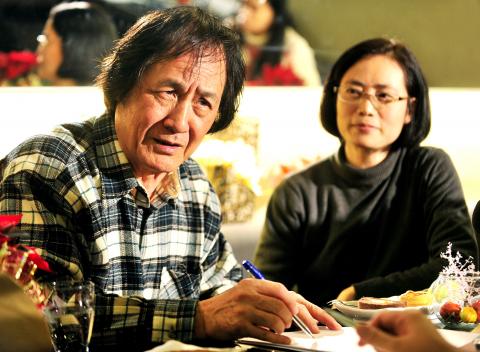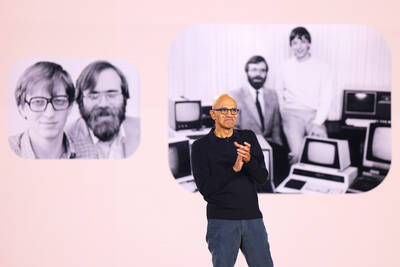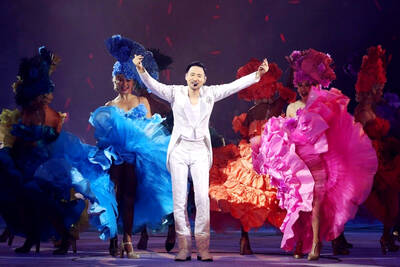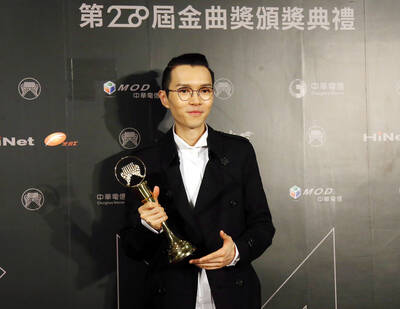This year marks the centennial of the one-act opera Duke Bluebeard’s Castle, written by Hungarian composer Bela Bartok in 1911, and now music lovers in Taiwan have a chance to see it performed here for the first time. Director and conductor Tseng Dau-hsiong says that the story is about relationships between men and women, but only two characters appear in the entire performance — a baritone and a mezzo-soprano — because “the code of the drama is to be found within the musical score.”
Bartok was one of the most important Eastern European composers of the 20th century, following on from Bedrich Smetana and Antonin Dvorak. Duke Bluebeard’s Castle was composed in 1911, but because of World War I it was not until 1918 that it was premiered at the State Opera House in Budapest. Bartok incorporated Hungarian folk melodies in the composition, filling the music with strong ethnic color. On top of that, orchestras derive immense enjoyment from the score’s colorful orchestration, strong logic and sound reasoning, which surprisingly give musicians a sense of playing without inhibition and in unison.
The opera tells the tale of a chaste lady named Judith who marries Duke Bluebeard despite the many rumors going around about him. On her wedding night, Judith, driven by curiosity, insists on prying into the secrets of her husband’s past, using feminine seduction to persuade Bluebeard to open a series of seven doors in his castle. In the end, Judith dies in the castle, just like Bluebeard’s former wives, all of whom are haunting it as ghosts.

Photo: Chen I-chuan, Taipei Times
照片:自由時報記者陳奕全
Tseng says that the opera’s seven doors are a metaphor for men’s secrets. A clever woman would only want to open three or four doors and leave it at that. This way the couple would get along fine or even live happily ever after, but, on the other hand, if a woman insists all the doors be opened, then “the couple would bring destruction upon themselves,” Tseng says. The finale includes a 20-second nude scene on stage. As Tseng says, “All this is specified and can be found in Bartok’s score, since the composer had already taken the plot into consideration while composing the music. It is a very classic work.”
This production of Duke Bluebeard’s Castle went through many twists and turns before it could be put on stage. The first hitch came when the original organizer, the National Taiwan Symphony Orchestra, decided to cancel the production for this year. Given that the National Theater and Concert Hall had already booked a schedule for the opera, Tseng felt it would be a pity to cancel, so he decided to put on the production himself. Much to his surprise, he did not get any funding from either the Council of Cultural Affairs or the National Culture and Arts Foundation. Consequently, Tseng had to spend the cash prize he won from the National Award for Arts this year, but that still leaves a shortfall of NT$3.6 million. As Tseng says, “The opera is rarely performed, but it is very much worth producing. After the performances, I would like to see what excuses the two arts bodies can give me for not funding the production.” The opera will be performed at the National Theater in Taipei next Friday and Saturday.
(LIBERTY TIMES, TRANSLATED BY LIN YA-TI)
匈牙利作曲家貝拉‧巴爾托克於一九一一年創作的獨幕現代歌劇《藍鬍子公爵的城堡》,至今正好一百年,樂壇首度有機會看到在台首演,導演兼指揮曾道雄說,此劇講述的其實是兩性關係,但全場只用男中音與次女高音兩個角色來鋪陳,因為「戲劇的密碼都在音符之下。」
繼貝多伊齊‧史麥塔納與安東寧‧德弗札克之後,巴爾托克是二十世紀最偉大的東歐作曲家之一。雖然《藍鬍子公爵的城堡》創作於一九一一年,但中間經歷一次世界大戰,直到一九一八年才在布達佩斯國立歌劇院首演。巴爾托克運用匈牙利民間音樂的旋律,民族色彩濃厚,再加上配器豐富、邏輯性強、合理,反倒讓樂團演奏起來暢快淋漓,有一氣呵成之感。
劇情講述一位純潔的姑娘尤蒂不顧傳言嫁給藍鬍子公爵。新婚之夜由於好奇心的驅使,尤蒂執意要查探丈夫過去的秘密,以色慾吸引藍鬍子公爵打開城堡中的七扇門。最後她自己也死在城堡內,與藍鬍子的前妻們一樣,都成了城堡內的魂魄。
曾道雄認為這齣歌劇隱喻男人的心中有七扇門,聰明的女生只打開三到四扇就好,就會相安無事,甚至會帶來幸福;但如果堅持要全部都打開,「兩人或許就得相互毀滅!」曾道雄說,在最後的結局裡,將會有一場長達二十秒的全裸,「這些都在巴爾托克的樂譜裡可以找到,他已經把劇情都交代在樂譜中,非常經典。」
其實,籌演《藍鬍子公爵的城堡》幾經周折,先是原本的主辦單位國立臺灣交響樂團決定今年不演出,但因兩廳院已將檔期留下,身為導演的曾道雄覺得可惜,就自己接下來做,沒想到文建會、國藝會都沒有任何補助。因此,曾道雄將國家今年的文藝獎獎金投進去還缺新台幣三百六十萬,他說,「這是一齣少見但非常值得製作的歌劇,我想知道正式演出之後,這兩個單位可以給我不補助的理由。」該劇將在下週五與週六於台北國家戲劇院演出。
(自由時報記者趙靜瑜)

Even as he grows older, Microsoft founder Bill Gates still fondly remembers the catalytic computer code he wrote 50 years ago that opened up a new frontier in technology. Although the code that Gates printed out on a teletype machine may look crude compared to what’s powering today’s artificial intelligence platforms, it played a critical role in creating Microsoft in April 1975 — a golden anniversary that the Redmond, Washington, company celebrated on April 4. Gates, 69, set the stage for that jubilee with a blog post reminiscing on how he and his old high school friend — the late Paul Allen

Australia’s strict immigration policies have long been criticized, particularly for how they treat people with disabilities. Having been residents of Australia for years, Scottish Laura Currie and her Italian partner, Dante Vendittelli, recently experienced the impact of these immigration policies. Their son Luca, born in Australia and diagnosed with cystic fibrosis, became the reason their residency application was denied due to the anticipated high healthcare costs. Had Luca been healthy, there would have been no objections to their permanent residency. This case not only highlights discrimination against disabled individuals, but also raises questions about fairness and inclusion within Australia’s immigration

A: After holding nine concerts in Kaohsiung and Taipei recently, “God of Songs” Jacky Cheung will stage three extra shows later this week. B: They’re compensation for the three shows he postponed last year due to illness. A: He also canceled three more shows in Guangzhou last month. His health is worrisome. B: When touring Guangzhou, he dedicated his hit “She Is Far Away” to late singer Khalil Fong. That’s so touching. A: Online music platform KKBOX has also launched a campaign to pay tribute to Fong. I can’t believe he died so young: he was only 41. A:

A: After “God of Songs” Jacky Cheung sang for late singer Khalil Fong recently, music streaming service KKBOX also paid tribute to Fong by releasing his greatest hits online. B: The 20th KKBOX Music Awards ceremony is taking place at the K-Arena in Kaohsiung tomorrow. Fong performed at the ceremonies in the past. A: Who are the performers this year? B: The performers include Taiwanese groups 911, Wolf(s), Ozone, Singaporean pop diva Tanya Chua, and K-pop group Super Junior. A: South Korean stars actually took four spots among KKBOX’s 2024 Top 10 singles, showing that K-pop is still